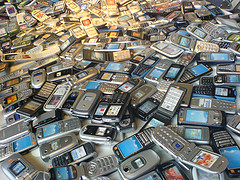
As part of my social start-up Appfrica Labs, my entrepreneurs here in Uganda and I have been thinking of ways of making the worldâs web applications work for us. For the most part, no web apps are really thinking beyond the first world, and certainly none are specifically targeting Uganda. But this is no oneâs fault, Uganda (if it wants web apps) should be contributing itâs own ideas and applications to the web. That said, last year Twitter shut off itâs international services early last year leaving much of the international market out in the cold. Rather than complain about that, we began building our own Laconi.ca server in Uganda, hacking it to work for our market.
This meant users couldnât need the web to use the service. That would have to be secondary to a social platform to MXit or QQ where authentication and registration was done 100% with your mobile device and number.
The Concept
Most countries in Africa share one thing in common: a high penetration of mobile devices. In terms of the evolution of communication technologies, Africa skipped a generation. Instead of e-mail and instant message, the average person here uses SMS, MMS or simply calls. It seemed natural, that a Twitter-like service was a natural fit for Africa. So, instead of knocking on Twitterâs door (they arenât interested, theyâve got their own problems) we turned to Laconi.ca. With Laconi.ca, the open source microblogging platform. We were able to do things, begin working on an alternative, and hack the source code to work for our market.
The Collaboration
Erik Hersman, David Kobia and the other people at Ushahidi, knew what we were working on and proposed a collaboration. But again, with most things cool in Africa, it takes some creativity to get things funded. So Erik approached me about submitting the idea to the Ashoka Changemakers competition.
The Goal
The Goal is simple, we want to create a platform that can be used for socializing, but more importantly, we want to create a public utility. Ushahidi has become just that. When a crisis breaks out, theyâre on the scene, allowing people to anonymously share reports of violence. But what if people could also use their everyday mobile social tool to do the same? The collaborative idea was born and you can check it out below. Regardless of whether or not we get this opportunity, the value in such a service is blatant and weâll continue work on developing it.
Update: I forgot to mention this post which illustrates an actual use scenario, offering insight as to the realized value of micro-blogging in a crisis situation.
You can support our idea for this Crisis, Microblogging and Emergencies App here.

About the author: Jonathan Gosier is a UI designer, software developer and writer. He currently lives in Kampala, Uganda where he incubates and invests in East African entrepreneurs as the CEO of Appfrica Labs. He's also a TED Fellow.
. Bookmark the
permalink. Trackbacks are closed, but you can .














Micro-Messaging and Crisis Reporting
As part of my social start-up Appfrica Labs, my entrepreneurs here in Uganda and I have been thinking of ways of making the worldâs web applications work for us. For the most part, no web apps are really thinking beyond the first world, and certainly none are specifically targeting Uganda. But this is no oneâs fault, Uganda (if it wants web apps) should be contributing itâs own ideas and applications to the web. That said, last year Twitter shut off itâs international services early last year leaving much of the international market out in the cold. Rather than complain about that, we began building our own Laconi.ca server in Uganda, hacking it to work for our market.
This meant users couldnât need the web to use the service. That would have to be secondary to a social platform to MXit or QQ where authentication and registration was done 100% with your mobile device and number.
The Concept
Most countries in Africa share one thing in common: a high penetration of mobile devices. In terms of the evolution of communication technologies, Africa skipped a generation. Instead of e-mail and instant message, the average person here uses SMS, MMS or simply calls. It seemed natural, that a Twitter-like service was a natural fit for Africa. So, instead of knocking on Twitterâs door (they arenât interested, theyâve got their own problems) we turned to Laconi.ca. With Laconi.ca, the open source microblogging platform. We were able to do things, begin working on an alternative, and hack the source code to work for our market.
The Collaboration
Erik Hersman, David Kobia and the other people at Ushahidi, knew what we were working on and proposed a collaboration. But again, with most things cool in Africa, it takes some creativity to get things funded. So Erik approached me about submitting the idea to the Ashoka Changemakers competition.
The Goal
The Goal is simple, we want to create a platform that can be used for socializing, but more importantly, we want to create a public utility. Ushahidi has become just that. When a crisis breaks out, theyâre on the scene, allowing people to anonymously share reports of violence. But what if people could also use their everyday mobile social tool to do the same? The collaborative idea was born and you can check it out below. Regardless of whether or not we get this opportunity, the value in such a service is blatant and weâll continue work on developing it.
Update: I forgot to mention this post which illustrates an actual use scenario, offering insight as to the realized value of micro-blogging in a crisis situation.
You can support our idea for this Crisis, Microblogging and Emergencies App here.